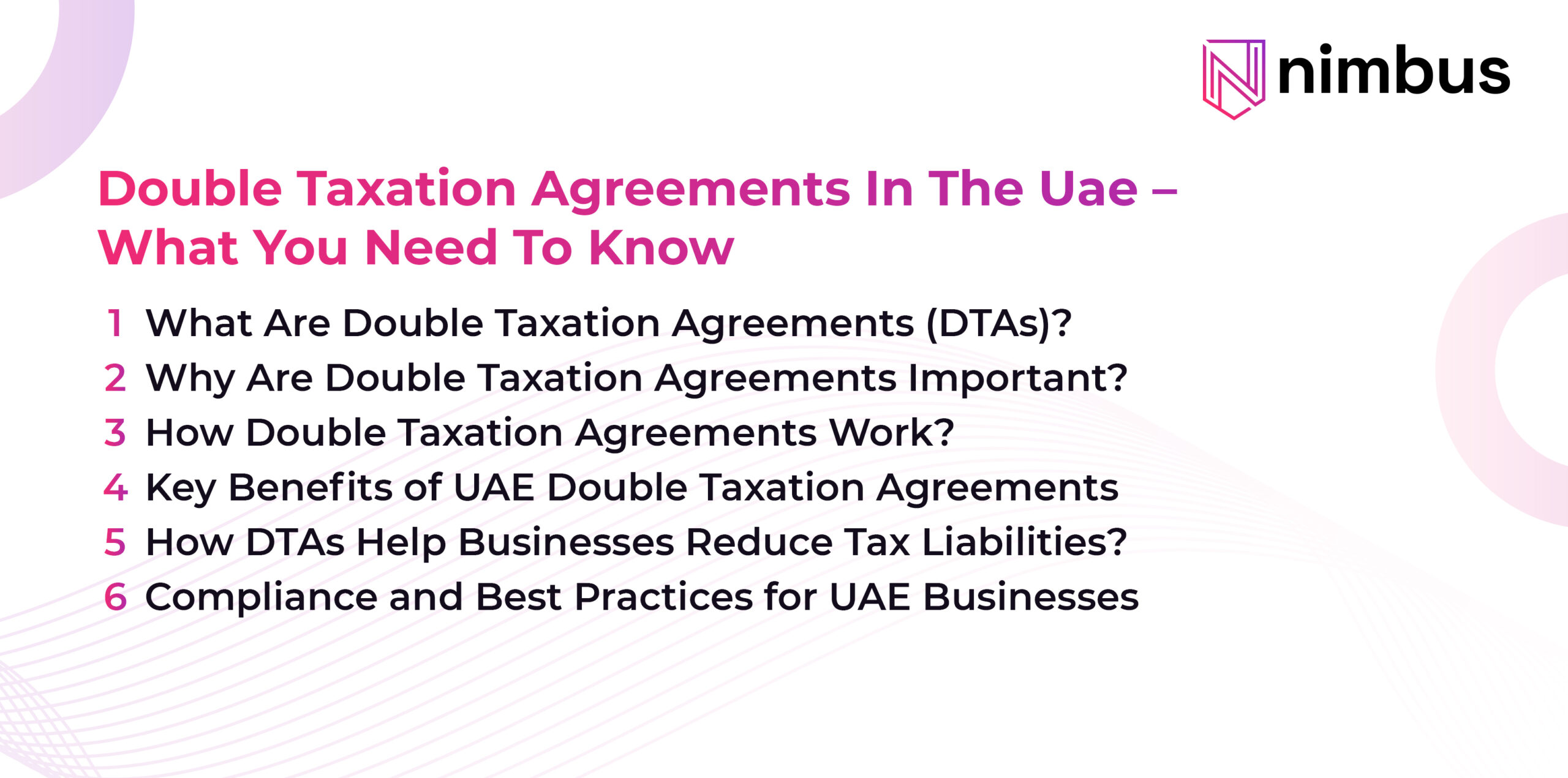As the UAE continues to secure its position as a global business hub, its extensive network of Double Taxation Agreements (DTAs) plays a crucial role in attracting foreign investment and facilitating international trade.
These agreements prevent businesses and individuals from being taxed twice on the same income, making cross-border operations more cost-effective and tax-efficient.
For UAE-based companies expanding internationally, understanding DTAs is essential for minimizing tax liabilities, ensuring compliance, and optimizing business growth. This blog explains what DTAs are, how they work, and the key benefits they offer to UAE businesses.
DOUBLE TAXATION AGREEMENTS IN THE UAE – WHAT YOU NEED TO KNOW

1. What Are Double Taxation Agreements (DTAs)?
Double Taxation Agreements (DTAs) are treaties between two countries that define how income is taxed when it is earned in one country but belongs to a resident of another.
Their primary objective is to eliminate the risk of double taxation, where income is taxed both in the country where it is earned and in the taxpayer’s country of residence.
By signing DTAs with 140 countries, including key markets in Europe, and the Middle East, the UAE has created a business-friendly tax environment, making it easier for companies to expand globally while reducing their tax burden.
2. Why Are Double Taxation Agreements Important?
DTAs offer several benefits for businesses and investors operating across borders the major ones being:
- Prevention of Double Taxation – Ensures that income is only taxed in one country, reducing financial burdens.
- Encouraging International Business Growth– Lower tax rates make cross-border trade and investment more attractive.
- Enhancing Tax Compliance and Transparency– DTAs align with OECD’s Base Erosion and Profit Shifting (BEPS) framework, helping prevent tax evasion.
For UAE-based businesses, DTAs provide a clear framework for tax obligations, enabling them to expand internationally without bearing unnecessary tax costs.
3. How Double Taxation Agreements Work?
DTAs regulate how different types of income are taxed, including:
- Business Profits– Taxed in the country where operations take place unless linked to a Permanent Establishment (PE).
- Dividends, Interest, and Royalties– DTAs reduce withholding tax rates, making cross-border payments more tax-efficient.
- Capital Gains – Certain capital gains may be exempt from taxation, depending on the treaty terms.
For example, under the UAE-India DTA, dividend withholding tax is reduced to 10% instead of India’s standard 20.8%, lowering the tax burden for UAE businesses investing in India.
4. Key Benefits of UAE Double Taxation Agreements
– Lower Withholding Taxes
Many countries impose withholding taxes on cross-border payments like dividends, interest, and royalties. DTAs help reduce these taxes, allowing businesses to repatriate profits more efficiently.
– Example of Reduced Withholding Tax Rates Under DTAs
| Income Type | UAE Rate | DTA Rate (Example) |
| Dividends | 0% | 10% (India) |
| Royalties | 0% | 5% (Germany) |
Since the UAE does not impose withholding taxes, DTAs mainly help UAE businesses reduce taxes on payments received from foreign countries.
– Permanent Establishment (PE) Clarity
A Permanent Establishment (PE) is a taxable presence of a business in a foreign country. DTAs help define what constitutes a PE and provide tax relief for short-term projects (typically under 6–12 months).
– Capital Gains Tax Exemptions
Under many DTAs, capital gains tax exemptions apply for smaller stake holdings. For example, under the UAE-Singapore DTA, capital gains tax is exempt for stakes below 25%, helping investors retain more profits from their international transactions.
5. How DTAs Help Businesses Reduce Tax Liabilities?
DTAs prevent double taxation using two primary methods.
- Exemption Method– Tax is applied in only one country, eliminating the need to pay tax twice.
- Credit Method– Taxes paid in one country are credited against tax liabilities in the UAE.
6. Compliance and Best Practices for UAE Businesses
To fully leverage DTAs, businesses should follow these best practices:
- Obtain a Tax Residency Certificate– Required to claim reduced withholding tax rates.
- Ensure Arm’s-Length Pricing for Transactions– Align with OECD guidelines to avoid compliance risks.
- Use the Mutual Agreement Procedure – DTAs provide a dispute resolution mechanism for tax conflicts.
- Prepare for the UAE’s 15% Domestic Minimum Top-up Tax – Effective January 2025 for multinationals under OECD’s Pillar Two framework.
Significance of DTA in Business Setup in the UAE
Double Taxation Agreements (DTAs) provide UAE businesses with major tax benefits, making international expansion more tax-efficient. By leveraging DTAs, companies can:
- Reduce withholding taxes on dividends, royalties, and interest.
- Avoid permanent establishment risks and additional corporate tax exposure.
- Benefit from capital gains tax exemptions in key markets.
- Ensure compliance with evolving global tax regulations.
With 140 active DTAs, the UAE remains a top destination for international business and investment. To maximize tax benefits, businesses should obtain Tax Residency Certificates, ensure proper documentation, and seek expert guidance.
By strategically applying DTA provisions, UAE companies can enhance profitability, reduce tax burdens, and expand globally with confidence.



